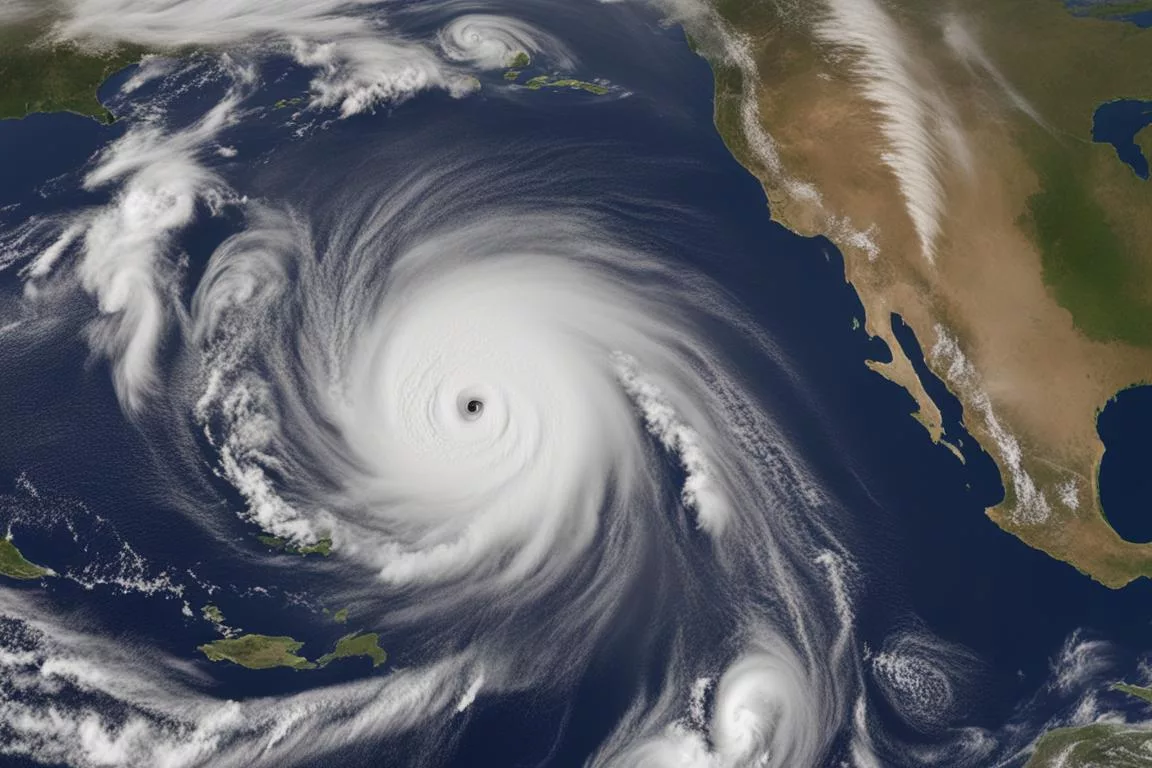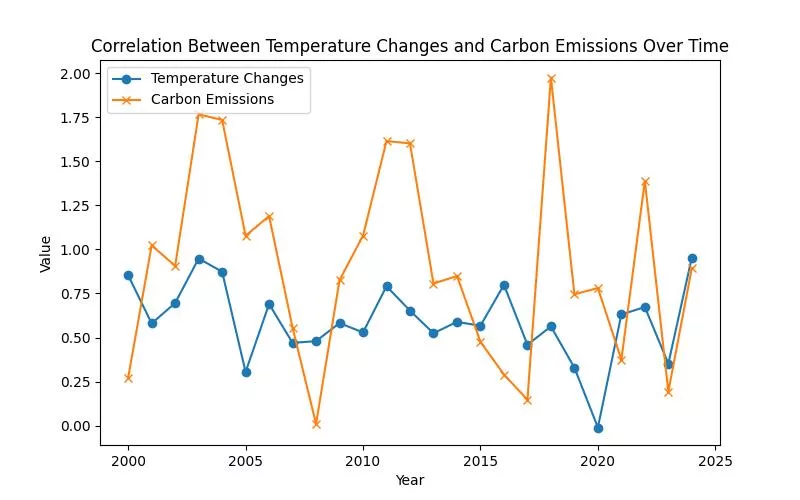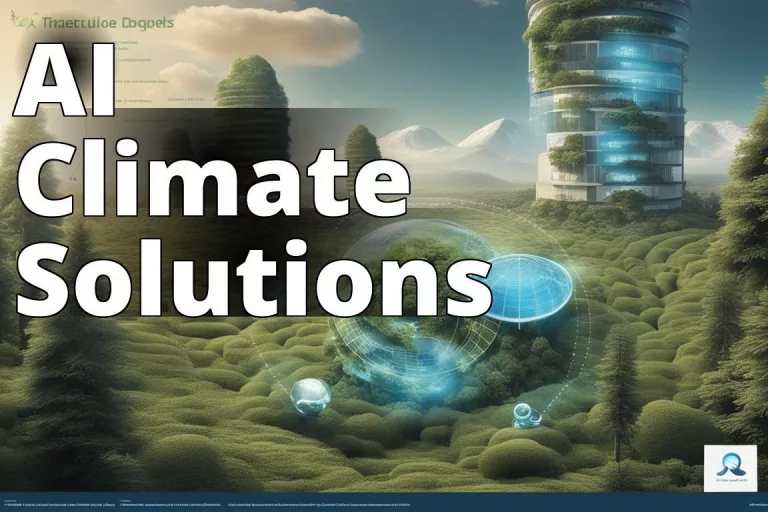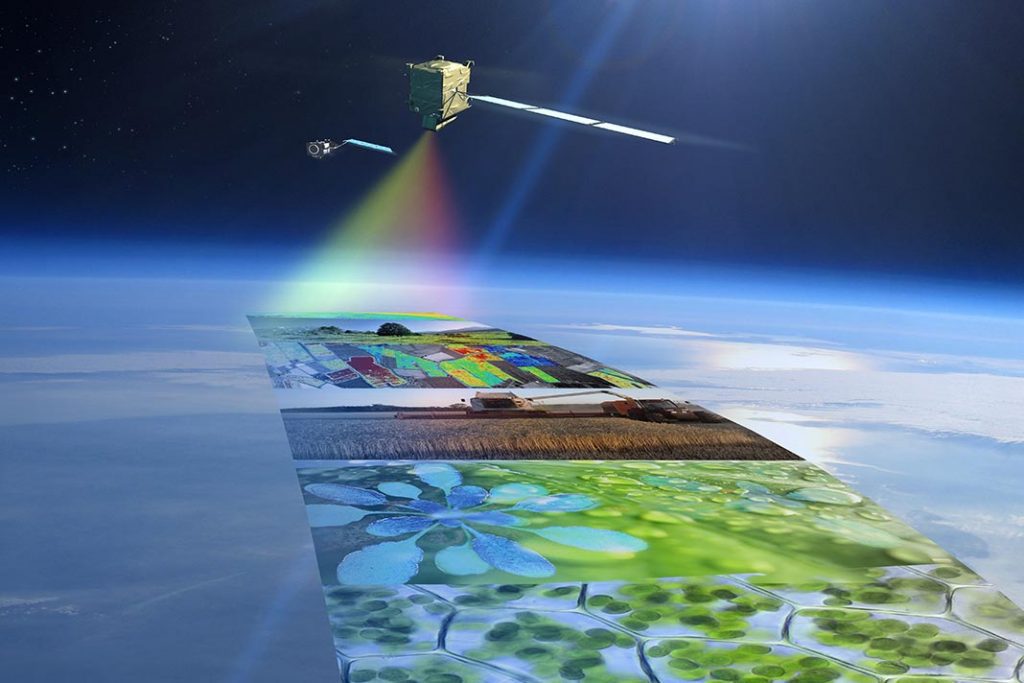Can AI revolutionize climate change prediction and facilitate the development of sustainable solutions?
As the global climate crisis continues to escalate, the role of artificial intelligence (AI) in climate change prediction is becoming increasingly crucial. AI, with its ability to analyze vast amounts of data and identify complex patterns, has the potential to revolutionize our understanding of climate change impacts and facilitate the development of sustainable solutions. This article delves into the significance of AI in climate change prediction, its applications in forecasting climate patterns, and the importance of accurate predictions for informed decision-making.
Learn about AI in Climate Change Prediction
By reading this article, you will learn:
- How AI is used in predicting climate change impacts and extreme weather events.
- The advantages and potential of using AI for climate change prediction.
- The challenges, limitations, and future opportunities of AI-driven climate change prediction.
Understanding AI’s Impact on Climate Change Prediction
The significance of AI in climate change prediction lies in its capacity to process and interpret environmental data with unparalleled speed and accuracy. By leveraging advanced algorithms, AI can analyze historical climate data, identify trends, and make predictions about future climate patterns and extreme weather events. This capability is instrumental in understanding the evolving dynamics of the Earth’s climate system and assessing potential risks associated with climate change.

AI Applications in Predicting Extreme Weather Events and Climate Patterns
AI technologies are increasingly used to predict and anticipate extreme weather events such as hurricanes, heatwaves, and droughts. By analyzing meteorological data, satellite imagery, and atmospheric parameters, AI-driven models can forecast the occurrence and intensity of these events, enabling early preparedness and mitigation strategies.
Advantages of Using AI for Climate Change Prediction and Risk Assessment
AI can process vast volumes of climate data in real time, enabling rapid assessment of changing climate patterns and associated risks. Additionally, AI algorithms can identify subtle correlations and non-linear relationships within climate datasets, providing insights that traditional statistical methods may overlook.
Potential for AI to Revolutionize Climate Change Prediction Methodologies
The potential of AI to revolutionize climate change prediction methodologies lies in its capacity to adapt and learn from new data inputs. As climate data continues to expand in complexity and volume, AI systems can continuously refine their predictive capabilities, leading to more accurate and reliable climate change forecasts.
Harnessing AI for Climate Change Prediction
The utilization of machine learning techniques plays a pivotal role in harnessing AI for precise climate change prediction and analysis. Machine learning algorithms can identify complex patterns within climate data, enabling the development of robust predictive models that account for various environmental variables and feedback mechanisms.

Utilizing Machine Learning for Precise Climate Change Prediction and Analysis
Machine learning algorithms can analyze historical climate data to identify patterns indicative of climate change trends. By recognizing these patterns, AI systems can make projections about future climate scenarios, contributing to a deeper understanding of the potential impacts of climate change on different regions and ecosystems.
Integration of AI Technologies in Climate Modeling and Forecasting Systems
AI technologies are integrated into climate modeling and forecasting systems to enhance their predictive capabilities. By incorporating AI-driven data processing and analysis, these systems can generate more accurate and detailed climate projections, aiding policymakers and environmental agencies in formulating effective adaptation and mitigation strategies.
Improving Accuracy and Reliability of Climate Change Prediction through AI Advancements
The continuous advancements in AI technologies are instrumental in improving the accuracy and reliability of climate change prediction models. Through ongoing research and development, AI systems are becoming more adept at handling complex climate datasets, leading to enhanced predictive precision and the identification of subtle climate change indicators.
Stanford University Case Study
In 2023 a team of Stanford University researchers demonstrated the significant potential of artificial intelligence (AI) in predicting global warming thresholds with remarkable accuracy. The study utilized AI to forecast the timing of critical climate thresholds, providing valuable insights into the trajectory of global warming. The findings suggest that the Earth is projected to surpass the crucial 1.5 degrees Celsius threshold within the next 10 to 15 years, even under scenarios of low emissions, and could potentially experience a 2 degrees Celsius increase in temperature.
This pioneering research, which was featured in The Guardian, highlights the instrumental role of AI in climate change prediction. By leveraging machine learning and AI algorithms, the study was able to analyze extensive climate data and identify patterns that contribute to more precise projections of global warming timelines. The implications of these predictions are profound, as they can inform and guide policy decisions, mitigation strategies, and adaptation efforts to address the impacts of climate change.
In addition to the study on global warming thresholds, Stanford researchers have also employed AI to unlock mysteries related to extreme weather events. By developing machine learning tools, they have made significant strides in identifying the conditions that lead to extreme precipitation events, particularly in the Midwest. This research underscores the diverse applications of AI in understanding and predicting extreme weather patterns, which are becoming increasingly relevant in the context of a changing climate.
The integration of AI in climate change research and prediction is recognized as a key factor in advancing the accuracy of climate models and predictions. By harnessing the power of AI to analyze vast amounts of data, researchers can enhance their understanding of complex climate systems and improve the reliability of future climate projections. This aligns with the broader consensus that AI is instrumental in improving climate models by leveraging extensive data and advanced algorithms.
Overall, the Stanford University study and related research initiatives exemplify the pivotal role of AI in climate change prediction. These efforts not only contribute to a deeper understanding of the impacts of global warming but also provide valuable tools for informing decision-making and developing effective strategies to mitigate and adapt to the challenges posed by climate change. As AI continues to advance, its potential to revolutionize climate science and support sustainable solutions remains a promising frontier in the fight against climate change.
Addressing Challenges and Limitations
Despite its potential, AI-based climate change prediction models face several challenges and limitations that need to be carefully addressed to ensure the credibility and robustness of predictions.
Complexity and Limitations of AI-Based Climate Change Prediction Models
The complexity of climate systems poses challenges for AI-based prediction models, as it requires the consideration of numerous interacting variables and feedback loops. Overcoming these complexities necessitates the development of sophisticated AI algorithms capable of capturing the multidimensional nature of climate processes.
Ethical Considerations and Biases in AI-Driven Climate Change Prediction
The ethical implications of AI-driven climate change prediction are critical to acknowledge. Biases in the training data or algorithmic decision-making can lead to erroneous predictions, potentially impacting policy decisions and resource allocation for climate change adaptation and mitigation efforts.
Overcoming Data Scarcity and Uncertainties in AI-Based Climate Modeling
Data scarcity and uncertainties in climate modeling present significant obstacles for AI-driven prediction systems. Addressing these challenges requires collaborative efforts to improve data collection methods, enhance data quality, and develop techniques to account for uncertainties in climate predictions.
AI-Driven Innovations in Climate Change Prediction
The integration of AI technologies has led to notable innovations in early detection of climate change impacts and the development of adaptive strategies to mitigate its effects.
Advancements in AI for Early Detection of Climate Change Impacts
AI systems are being deployed to detect early indicators of climate change impacts, such as shifts in temperature patterns, sea level rise, and ecological disturbances. By identifying these indicators, AI facilitates proactive measures to address emerging climate-related challenges.

AI-Enabled Climate Risk Prediction and Adaptive Strategies
AI plays a pivotal role in predicting climate risks and formulating adaptive strategies to enhance resilience against climate change impacts. By simulating various climate scenarios, AI-driven models aid in developing tailored adaptation measures for vulnerable communities and ecosystems.
AI’s Role in Identifying and Addressing Climate Change Vulnerabilities
AI technologies are instrumental in identifying climate change vulnerabilities in different regions and sectors. By analyzing diverse datasets, AI systems can pinpoint areas susceptible to climate risks, guiding policymakers and stakeholders in prioritizing interventions and resource allocation.

Environmental and Societal Impacts of using AI for Climate Change Prediction
The environmental impact of AI technologies used in climate change prediction, including energy consumption and electronic waste, requires careful evaluation. Implementing sustainable AI infrastructure and energy-efficient computing practices is essential to minimize the ecological footprint of AI-driven climate modeling.
Read more: The environmental impact of Generative AI
AI-driven climate change predictions have profound societal implications, influencing policy decisions, resource allocation, and public perceptions. Ensuring transparency, ethical use of AI, and inclusive decision-making processes are imperative to address societal concerns and build trust in AI-driven climate predictions.
Balancing AI Advancements with Sustainable Practices in Climate Change Prediction
Balancing AI advancements with sustainable practices is crucial for the responsible deployment of AI in climate change prediction. Emphasizing eco-friendly AI development and integrating sustainability considerations into AI-driven climate modeling frameworks is essential for long-term environmental and societal well-being.

Future Outlook and Opportunities
The future of AI in climate change prediction holds immense promise, with opportunities for further advancements and innovations that can reshape the landscape of climate modeling and risk assessment.
Anticipated advancements in AI technologies, including enhanced deep learning algorithms and neural network architectures, offer potential avenues for refining climate change prediction models and overcoming existing challenges.
Emerging trends such as federated learning, edge computing, and explainable AI present new prospects for enhancing the capabilities of AI in climate change prediction. These trends hold the potential to address current limitations and expand the scope of AI-driven climate modeling.
Opportunities for AI to Revolutionize Climate Change Prediction in the Coming Decade
The coming decade presents opportunities for AI to revolutionize climate change prediction by integrating diverse datasets, leveraging cloud-based computing resources, and enabling real-time climate monitoring. These opportunities pave the way for more comprehensive and actionable insights into climate change impacts.
Conclusion
In conclusion, the transformative potential of AI in climate change prediction is poised to play a pivotal role in shaping sustainable solutions and adaptive strategies. The continued collaboration between researchers, practitioners, and policymakers is essential to harness the full potential of AI in addressing the challenges of climate change. As AI technologies continue to evolve, the call for sustained research and innovation in leveraging AI for sustainable climate change prediction and adaptation efforts remains paramount.
By incorporating AI technologies into climate change prediction and risk assessment, we can empower sustainable decision-making and contribute to a more resilient and adaptive approach to addressing the global climate crisis.
In crafting this article, I referenced the following sources:
- Stanford University News – AI predicts global warming will exceed 1.5 degrees in 2030s
- Scientific American – Climate Change Could Stump AI Weather Prediction
Questions & Answers
Question: Who is using AI in climate change prediction?
Answer: Scientists, researchers, and tech companies are utilizing AI for climate change prediction.
Question: What is the role of AI in climate change prediction?
Answer: AI processes complex data to make accurate climate change predictions and identify patterns.
Question: How does AI contribute to climate change prediction?
Answer: AI analyzes vast amounts of data to forecast climate patterns and assess potential impact.
Question: What if I don’t trust AI for climate change prediction?
Answer: AI predictions are based on robust data analysis and scientific algorithms, increasing reliability.
Question: How can AI enhance climate change prediction accuracy?
Answer: AI’s machine learning algorithms improve prediction accuracy by learning from new data.
Question: What are the benefits of AI in climate change prediction?
Answer: AI enables faster and more precise climate change predictions, aiding in proactive solutions.
Next Steps
Round Table Environmental Informatics (RTEI) is a consulting firm that helps our clients to leverage digital technologies for environmental analytics. We offer free consultations to discuss how we at RTEI can help you.


